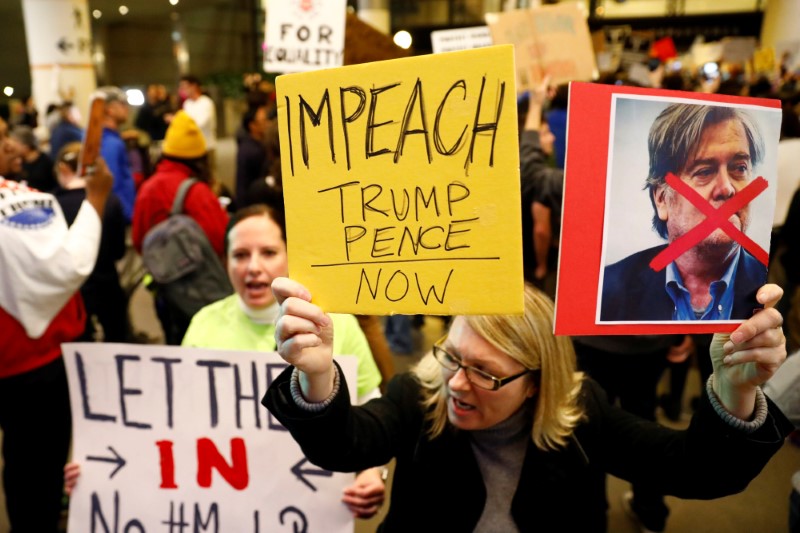Impeachment is the first step in removing the president of the United States or any other top-ranking official in the government. Though he has been in office for less than two weeks, President Donald Trump already faces calls for his removal, in addition to the numerous and massive protests, rallies and demonstrations against him. What is impeachment?
During the inaugural oath, a new president agrees to uphold the responsibilities of the office and to “preserve, protect and defend the Constitution of the United States.”
If a president is found to have abused his or her power or committed “treason, bribery, or other high crimes and misdemeanors” per Article II, Section 4 of the Constitution, he or she could be impeached. RELATED: Can Trump be impeached for his campaign’s ties to Russia? In the Federalist papers, Alexander Hamilton listed breaking a law, abusing power and violating the public’s trust as impeachable acts. In 1970, then-Rep. Gerald R. Ford defined impeachable offenses as “whatever a majority of the House of Representatives considers it to be at a given moment in history.” Congress has issued articles of impeachment for “exceeding the constitutional bounds of the powers of the office,” “behavior grossly incompatible with the proper function and purpose of the office” and “employing the power of the office for an improper purpose or for personal gain.” Impeachment, a charge of misconduct, does not immediately signal removal from office.
The process
Starting in the House of Representatives, an article of impeachment can be introduced like any other bill, per Article II of the Constitution: “The President, Vice President and all Civil Officers of the United States, shall be removed from Office on Impeachment for, and Conviction of, Treason, Bribery, or other high Crimes and Misdemeanors.” The information in the article of impeachment is the basis of the case against the accused official, such as a president. The House Judiciary Committee will decide if a resolution to impeach is in order. Then the full House has to vote on each article of impeachment, requiring a majority to approve the article, which is then sent to the Senate for trial.
CRS Report for Congress by Metro US on Scribd
In the Senate
The case is tried in the Senate as if it were a court with House representatives acting as prosecutors,according to congressional rules.
The chief justice of the Supreme Court presides over the trial with the senators acting as jurors. In a private session, the verdict is debated by the senators.
Then, the Senate holds an open session to publicly vote on the verdict. If found guilty by two-thirds of the Senate, the president would be removed from power and never allowed to hold a government position again.
No president has ever been convicted by the Senate and removed from office.
Trump’s frenemies
In order for Trump to be impeached, an article would have to be filed in the House. To remove him from office, he would have to be convicted by the Senate. Both houses of Congress are Republican-controlled, which makes impeachment unlikely. However, Republicans like Speaker Paul Ryan were vehemently against then-candidate Trump during the presidential campaign.
Potential problems facing Trump
Presidents are immune from lawsuits that occur during their time in office, but Trump’s life before being POTUS was rife with lawsuits. Furthermore, criminal proceedings forallegedly raping a 13-year-old girlweredropped when the accuser decided to withdraw her lawsuit.
Former students of Trump University sued the self-proclaimed billionaire for fraud, saying they paid $35,000 to learn real estate “secrets” from “hand-picked” instructors, but the information was allegedly worthless. As president-elect, Trumpagreed to settle for $25 millionin November, putting that case to bed before he was handed the keys to the White House.
University of Utah law professor Christopher Lewis Peterson says there already exists valid legal reasons why Trump should be impeached, In a 22-page analysis paper, Peterson points to Trump’s alleged violations related to “fraud, racketeering, RICO, high crimes and misdemeanors.”
Trump impeachment argument by Christopher Lewis Peterson by Metro US on Scribd
American University political historian Allan Lichtman, who has correctly called the winner of every presidential election since 1984, in November predicted a Trump impeachment.
“They don’t want Trump as president because they can’t control him. He’s unpredictable,” Lichtmantold The Washington Postafter Election Day. “They’d love to have Pence — an absolutely down-the-line, conservative, controllable Republican. And I’m quite certain Trump will give someone grounds for impeachment, either by doing something that endangers national security or because it helps his pocketbook.”
This article, originally published on Jan. 31, was updated to correct the error naming Andrew Jackson as the first president to be impeached.The first U.S. president to be impeached was the seventh president Andrew Johnson, not Jackson. Jackson becamethe only president to be censured in U.S. history after his attempts todefund the Bank of the United States. His actions against the native Americans of the Cherokee tribe would be considered by some today as crimes against humanity, according to historians.



















